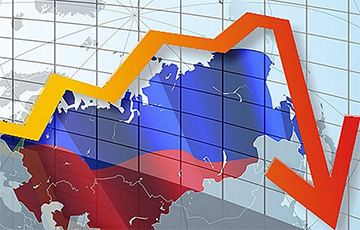Russian Exports Collapses By $170 Billion In A Year
4- 19.01.2024, 23:56
- 11,402

High oil prices, which helped the Russian economy avoid collapse after the start of the war, are left behind.
Last year, Russian exports amounted to $422.7 billion — $169.4 billion (almost 30%) less than in the record year of 2022 ($592.1 billion) — this is the preliminary assessment of the Central Bank. This is the minimum since 2020, and if we exclude the pandemic year, since 2018.
At the same time, imports increased by $27.9 billion (10%) and returned to the pre-war level — $304.4 billion, as in 2021. This was the main factor in the collapse of the current account balance of the balance of payments — almost 5 times from $238 billion in 2022 to $50.2 billion.
According to the Ministry of Finance of the Russian Federation, the average price of the main brand of Russian oil, Urals, in 2023 was 17% lower than a year earlier: $63 per barrel versus $76.1 in 2022. Gas exports also collapsed: the result of the gas war unleashed by the Kremlin with Europe There was an almost complete loss of the main export market. The European embargo forced coal miners to switch to Asian markets, but they encountered problems when exporting coal, the Central Bank writes with reference to coal companies: “Tangible losses are being suffered by the largest coal region of the country - Kuzbass, where the decline in exports, which has continued for two quarters in a row, has already led to production reduction in August–October by an average of 5% per month. Plans for the export of coal have not been fulfilled due to a lack of transportation capacity.” There are problems in other industries too.
According to Rosstat, over 10 months, revenues from all major export items decreased, except food: it brought in $36 billion in January-October — 9.1% more than a year earlier. Otherwise, the decline ranged from 13% in metals to 23% in machinery and equipment and 37% in chemicals. The main commodity exports collapsed by 35% (mineral products include oil and gas).
Declining exports did not prevent the growth of foreign assets. Despite all the efforts of the authorities — first informal, and then directive, in the form of a presidential decree on the mandatory return and sale of most of the foreign exchange earnings of the largest exporters, they increased by $38.3 billion over the year (a year earlier the increase was $101.5 billion). The main influence was exerted by: the accumulation of residents’ funds in foreign accounts and deposits, the growth of “other investments” in the form of debt for unfinished foreign trade settlements, as well as the increase in direct investment, the Central Bank lists.
These data may still be revised. For example, a month ago, the Central Bank clarified the estimate for October exports, reducing it by more than 10%: from $37.2 billion to $33 billion, and now it is $34.3 billion.
This year, the Central Bank predicts a slight increase in exports — to $441 billion, with a slight reduction in imports — to $292 billion.
Беларусь неожиданно стала самым подорожавшим направлением для россиян
Belarus Unexpectedly Exhibits Highest Upward Jump In Prices Among Tourist Destinations Available To Russians
Most Cost-Consuming Destination For Russians
Will there be fewer guests from the east?
Tourist trips to Belarus in 2023 have become more expensive for Russians the most. This is evidenced by the statistical data published by Rosstat, writes Moskovsky Komsomolets.
As of December last year, the average price of a trip to our country for a Russian was 30.8 thousand Russian rubles (about 1,130 Belarusian rubles). In annual terms, the cost of visiting Belarus increased by 37.6%.
Even the countries of Central Asia lag behind in this matter. A trip there will cost 65 thousand Russian rubles (almost 2,400 Belarusian rubles), but the increase in price is within 30%. Tours to the countries of Southeast Asia turned out to be the most expensive — more than 113 thousand Russian rubles (4,150 Belarusian rubles), while they became more expensive by only 15%.
According to RBC, the rise in prices for trips to Belarus can be explained by a general reduction in the list of tourist destinations available to Russian tourists. Previously, tour operators announced an increase in demand for trips to our country, explaining it, among other things, by sanctions restrictions: Russians go here for shopping, including the purchase of car parts, lenses and fashion brands that have left Russia.










